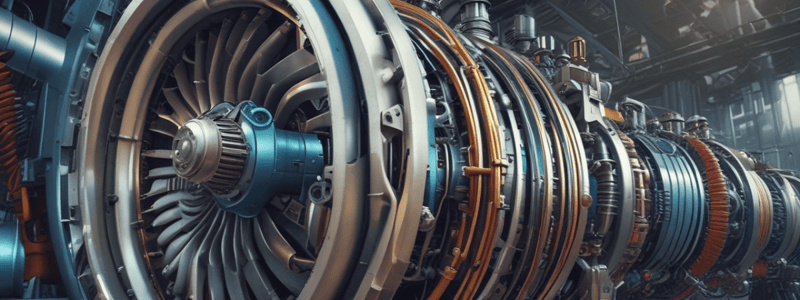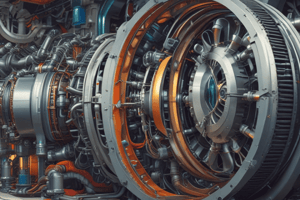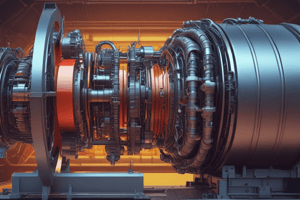Podcast
Questions and Answers
At what initial armature position is no voltage induced as the conductors are parallel to the magnetic field?
At what initial armature position is no voltage induced as the conductors are parallel to the magnetic field?
- 90°
- 270°
- 0° (correct)
- 180°
In a complete cycle of 360°, how is the positive and negative part distributed when the armature rotates in a generator?
In a complete cycle of 360°, how is the positive and negative part distributed when the armature rotates in a generator?
- Completely negative
- One-third positive, two-thirds negative
- Completely positive
- Half positive and half negative (correct)
During which rotation phase does the armature cut fewer and fewer lines of flux, causing the induced voltage to decrease?
During which rotation phase does the armature cut fewer and fewer lines of flux, causing the induced voltage to decrease?
- 180° to 270°
- 0° to 90°
- 90° to 180° (correct)
- 270° to 360°
What is the term used for a generator that produces a single, continuously alternating voltage?
What is the term used for a generator that produces a single, continuously alternating voltage?
As the armature rotates from 180° to 270°, in which direction is the induced voltage built?
As the armature rotates from 180° to 270°, in which direction is the induced voltage built?
In a single-phase alternator, how are the stator windings (armature) connected?
In a single-phase alternator, how are the stator windings (armature) connected?
What is the primary function of the exciter field winding in a brushless alternator?
What is the primary function of the exciter field winding in a brushless alternator?
How is the output of the brushless alternator regulated?
How is the output of the brushless alternator regulated?
Why is there no need to flash the field in a brushless alternator?
Why is there no need to flash the field in a brushless alternator?
What is the purpose of the six silicon diodes in a brushless alternator?
What is the purpose of the six silicon diodes in a brushless alternator?
In the brushless alternator described, how are the main output stator windings connected?
In the brushless alternator described, how are the main output stator windings connected?
What is the purpose of the laminated frame in the alternator housing?
What is the purpose of the laminated frame in the alternator housing?
What is the main advantage of using a permanent magnetic generator (PMG) over a generator with brushes and slip rings?
What is the main advantage of using a permanent magnetic generator (PMG) over a generator with brushes and slip rings?
How can PMGs be designed to operate?
How can PMGs be designed to operate?
What is the purpose of the exciter field in a brushless alternator?
What is the purpose of the exciter field in a brushless alternator?
In a two-phase alternator, the windings of the two phases are positioned at what angle to each other?
In a two-phase alternator, the windings of the two phases are positioned at what angle to each other?
What is the purpose of the permanent magnets in a brushless alternator?
What is the purpose of the permanent magnets in a brushless alternator?
What is the phase difference between the outputs of the two phases in a two-phase alternator?
What is the phase difference between the outputs of the two phases in a two-phase alternator?
Why are brushless alternators more efficient at high altitudes compared to alternators with brushes?
Why are brushless alternators more efficient at high altitudes compared to alternators with brushes?
Which of the following statements about a two-phase alternator is true?
Which of the following statements about a two-phase alternator is true?
In the schematic described in the text, when the rotor poles are opposite the windings of Phase A, what is the voltage induced in Phase B?
In the schematic described in the text, when the rotor poles are opposite the windings of Phase A, what is the voltage induced in Phase B?
As the rotor rotates counterclockwise from a position where it is opposite the windings of Phase A, what happens to the voltages induced in Phase A and Phase B?
As the rotor rotates counterclockwise from a position where it is opposite the windings of Phase A, what happens to the voltages induced in Phase A and Phase B?
How does the stator of a two-phase alternator differ from that of a single-phase alternator?
How does the stator of a two-phase alternator differ from that of a single-phase alternator?
What is the relationship between line voltage and phase voltage in a delta-connected stator?
What is the relationship between line voltage and phase voltage in a delta-connected stator?
What is the relationship between line current and phase current in a delta-connected stator?
What is the relationship between line current and phase current in a delta-connected stator?
Which of the following is the formula for calculating power in a 3-phase circuit?
Which of the following is the formula for calculating power in a 3-phase circuit?
How is the power in a 3-phase circuit calculated in kilowatts (kW)?
How is the power in a 3-phase circuit calculated in kilowatts (kW)?
How is the power in a 3-phase circuit calculated in kilovolt-amperes (kVA)?
How is the power in a 3-phase circuit calculated in kilovolt-amperes (kVA)?
What is the typical power rating of AC generators?
What is the typical power rating of AC generators?
What type of motor is the most commonly used AC motor?
What type of motor is the most commonly used AC motor?
Which type of motor has a rotor energized with DC voltage?
Which type of motor has a rotor energized with DC voltage?
How are the three-phase windings in the stator of a three-phase induction motor arranged?
How are the three-phase windings in the stator of a three-phase induction motor arranged?
What is the purpose of the dot in the diagram showing the three-phase windings?
What is the purpose of the dot in the diagram showing the three-phase windings?
How can the electromagnetic polarity of the poles be determined at any given instant?
How can the electromagnetic polarity of the poles be determined at any given instant?
What is the relationship between the phase windings in a three-phase induction motor?
What is the relationship between the phase windings in a three-phase induction motor?
What is the name of the speed at which the magnetic field inside an AC motor rotates?
What is the name of the speed at which the magnetic field inside an AC motor rotates?
Which of the following formulas is used to calculate the synchronous speed (Ns) of an AC motor?
Which of the following formulas is used to calculate the synchronous speed (Ns) of an AC motor?
What is the relationship between the rotational speed of the motor shaft and the synchronous speed (Ns)?
What is the relationship between the rotational speed of the motor shaft and the synchronous speed (Ns)?
Why is the arrangement using a permanent magnet rotor not used in practical motors?
Why is the arrangement using a permanent magnet rotor not used in practical motors?
What is the purpose of the rotating magnetic field in an AC motor?
What is the purpose of the rotating magnetic field in an AC motor?
What is the main reason that practical motors do not use the simple arrangement with a permanent magnet rotor described in the text?
What is the main reason that practical motors do not use the simple arrangement with a permanent magnet rotor described in the text?
What is the purpose of energizing the squirrel-cage windings in a synchronous motor?
What is the purpose of energizing the squirrel-cage windings in a synchronous motor?
What disadvantage does a practical synchronous motor have in terms of rotor operation?
What disadvantage does a practical synchronous motor have in terms of rotor operation?
What is the purpose of using a mechanical switching device that operates on centrifugal force in a synchronous motor?
What is the purpose of using a mechanical switching device that operates on centrifugal force in a synchronous motor?
What type of rotor does a synchronous motor typically have?
What type of rotor does a synchronous motor typically have?
What happens when a synchronous motor rotor is excited with DC?
What happens when a synchronous motor rotor is excited with DC?
Why do synchronous motors need some kind of separate starting apparatus?
Why do synchronous motors need some kind of separate starting apparatus?
What is the main advantage of using a frequency converter to control the speed of an AC induction motor?
What is the main advantage of using a frequency converter to control the speed of an AC induction motor?
What is the typical method used to change the rotation speed of AC induction motors, apart from using a frequency converter?
What is the typical method used to change the rotation speed of AC induction motors, apart from using a frequency converter?
What is the term used to describe the percentage difference between the full-load speed and the synchronous speed of an asynchronous motor?
What is the term used to describe the percentage difference between the full-load speed and the synchronous speed of an asynchronous motor?
What is the fundamental difference between synchronous motors and asynchronous motors?
What is the fundamental difference between synchronous motors and asynchronous motors?
What is the typical value of slip for a normal asynchronous motor?
What is the typical value of slip for a normal asynchronous motor?
What is the relationship between the number of poles in a three-phase motor and a single-phase motor, if they rotate at the same speed?
What is the relationship between the number of poles in a three-phase motor and a single-phase motor, if they rotate at the same speed?
What is the purpose of not having insulation between the core and the bars in an induction motor rotor?
What is the purpose of not having insulation between the core and the bars in an induction motor rotor?
What is the main difference between a squirrel-cage rotor and a wound rotor?
What is the main difference between a squirrel-cage rotor and a wound rotor?
What is the basic principle of operation for both squirrel-cage and wound rotor induction motors?
What is the basic principle of operation for both squirrel-cage and wound rotor induction motors?
What materials are typically used for the conducting bars in a squirrel-cage rotor?
What materials are typically used for the conducting bars in a squirrel-cage rotor?
How are the rotor bars connected at the ends in a squirrel-cage rotor?
How are the rotor bars connected at the ends in a squirrel-cage rotor?
What is the typical construction method for small to medium-sized squirrel-cage rotors?
What is the typical construction method for small to medium-sized squirrel-cage rotors?
Flashcards are hidden until you start studying
Study Notes
Permanent Magnetic Generators (PMGs)
- PMGs do not require power supply to the field, eliminating the need for brushes or slip rings.
- They can be designed to operate in either voltage mode (open circuit) or current mode (closed circuit).
- PMGs are crucial components for providing power to the ignition exciter, FADECs (Full Authority Digital Engine Control), and other accessories on gas turbine engines.
Brushless Alternators
- Brushless alternators are used in large jet-powered aircraft and are usually air-cooled.
- They are more efficient at high altitudes due to the absence of brushes or slip rings, which reduces the risk of brush arcing.
- A brushless alternator consists of three separate fields: a permanent magnetic field, an exciter field, and a main output field.
- The permanent magnets produce the magnetic flux to start the generator, resulting in an output before field current flows.
- The magnetism produced by the magnets induces voltage into an armature, which carries the current to a generator control unit (GCU).
- The GCU monitors and regulates the main generator's output by controlling the amount of current that flows into the exciter field.
Alternator Phase Types
- Single-phase alternators produce a single, continuously alternating voltage.
- The stator (armature) windings are connected in series, resulting in a single-phase AC voltage.
- The three-phase output stator windings are wound in slots in the laminated frame of the alternator housing and are connected in a Y configuration.
- Two-phase output alternators have windings physically at right angles (90°) to each other, resulting in a 90° phase shift between the outputs.
- A three-phase stator can be connected in a delta configuration (Δ), where line voltages are equal to phase voltages, and each line current is equal to 1.73 times the phase current.
AC Motor Fundamentals
- AC motors operate on the principle of a rotating magnetic field.
- The magnetic field inside an AC motor rotates at a speed related to the frequency of the current supply, known as the synchronous speed (Ns).
- The rotational speed of the motor shaft is related to the synchronous speed.
- The synchronous speed (Ns) can be calculated using the formula: Ns = 120f / P, where f is the frequency in Hz and P is the number of poles per phase.
Synchronous Motors
- Synchronous motors operate exactly at the synchronous speed with no slip.
- The rotor is of a constant polarity (either a permanent magnet or an energised electromagnet) and the windings of the stator are wrapped in a way that produces a rotating magnetic field.
- Synchronous motors provide very little torque at zero speed and require a separate starting apparatus.
- They are designed for use with either polyphase or single-phase power systems.
Induction Motors
- Induction motors are the most commonly used AC motors.
- The rotor is constructed of a number of conducting bars running parallel to the axis of the motor and two conducting rings on the ends.
- The rotor bars are short-circuited at each end by a solid ring, creating a "squirrel-cage" rotor.
- The rotor is made of a laminated cylinder with slots in its surface, and the windings in the slots are one of two types.
- The rotor windings can be made of copper or aluminum.
Speed Control
- Induction motors are practically fixed-speed devices.
- There are only two practical methods to change the rotation speed of AC induction motors: using a frequency converter or a motor with separate windings for different speeds.
- A frequency converter can run a three-phase AC motor at a wide speed range, but the performance of the motor is usually reduced outside its optimal operation speed.
- Variable speed motors can be achieved using a frequency converter, but the motor's performance is usually reduced outside its optimal operation speed.
Studying That Suits You
Use AI to generate personalized quizzes and flashcards to suit your learning preferences.




